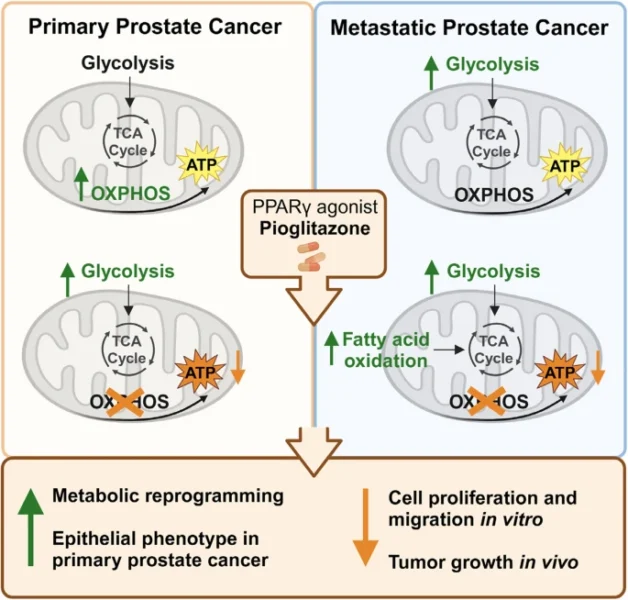A common medication used to treat type 2 diabetes may hold unexpected potential in the fight against prostate cancer, according to new research. The drug pioglitazone appears to reprogram cancer cells’ metabolism, essentially starving them of the energy needed to multiply and spread.
Scientists from an international team that included researchers from Umeå University in Sweden discovered that diabetic prostate cancer patients treated with pioglitazone showed remarkable outcomes during their study period.
“This is a significant discovery. For the first time, we have clinical observations showing that prostate cancer patients with diabetes who received drugs targeting the protein remained relapse-free during the period we followed them,” said Lukas Kenner, visiting professor at Umeå University and one of the study’s lead authors.
How the Diabetes Drug Fights Cancer
The medication works by targeting a protein called PPARγ (peroxisome proliferator-activated receptor gamma), which plays a crucial role in both diabetes and cancer pathways. Pioglitazone belongs to a class of medications called thiazolidinediones (TZDs), which are synthetic insulin sensitizers.
When applied to prostate cancer cells in laboratory studies, pioglitazone did more than just slow their growth—it fundamentally altered their metabolism. This metabolic reprogramming ultimately reduced the cancer cells’ ability to produce energy and restricted their ability to migrate through tissue, potentially limiting metastasis.
Key Findings from the Research
- Pioglitazone significantly reduced prostate cancer cell proliferation in laboratory tests
- The drug decreased tumor growth in animal models of metastatic prostate cancer
- Diabetic prostate cancer patients treated with PPAR agonists showed no biochemical recurrence over the study period
- The medication altered key metabolic pathways in cancer cells, reducing their energy production
- Treatment promoted more favorable “epithelial” cell characteristics in primary prostate cancer cells
What makes this finding particularly intriguing is the dual nature of the relationship between diabetes and prostate cancer. While some studies suggest diabetes may lower prostate cancer risk, others show conflicting data, especially regarding survival rates when cancer does develop.
From Bench to Bedside: Clinical Implications
The research team examined data from 69 prostate cancer patients with type 2 diabetes who had undergone radical prostatectomy (surgical removal of the prostate) between 2014 and 2023. Among these patients, those treated with PPAR agonists like pioglitazone showed no signs of biochemical recurrence—a key indicator of cancer returning.
Could this medication designed for diabetes become a regular part of prostate cancer treatment? The researchers are cautiously optimistic but emphasize more work is needed.
“The findings are very promising, but further clinical studies are needed to both confirm the results and to investigate whether the treatment can also be used in patients with prostate cancer who do not have diabetes,” Kenner noted.
The Connection Between Metabolic Diseases and Cancer
This study adds to growing evidence that metabolic pathways may represent an untapped avenue for cancer treatment. Prostate cancer is known to undergo significant metabolic shifts as it progresses from early to advanced stages, altering how cells generate energy.
The research revealed that pioglitazone affects several key cellular mechanisms, including reducing mitochondrial ATP production (the energy currency of cells) and influencing signaling pathways like mTOR that regulate cell growth and metabolism.
Looking Ahead: Next Steps in Research
While these results are encouraging, the researchers emphasize that larger, prospective clinical trials are necessary before pioglitazone could be recommended specifically for prostate cancer treatment.
What makes this approach particularly appealing is that pioglitazone already has established safety data as an approved medication, potentially shortening the path to clinical use for cancer if further studies confirm these findings.
Prostate cancer remains the second most prevalent cancer in men, accounting for approximately 29% of cancer incidence in Western countries. New treatment approaches are urgently needed, particularly for advanced forms of the disease that become resistant to standard therapies.
This research was conducted by an international team including scientists from Austria, the Czech Republic, Germany, the United Kingdom, and Sweden, and was published in the journal Molecular Cancer.
If our reporting has informed or inspired you, please consider making a donation. Every contribution, no matter the size, empowers us to continue delivering accurate, engaging, and trustworthy science and medical news. Independent journalism requires time, effort, and resources—your support ensures we can keep uncovering the stories that matter most to you.
Join us in making knowledge accessible and impactful. Thank you for standing with us!

